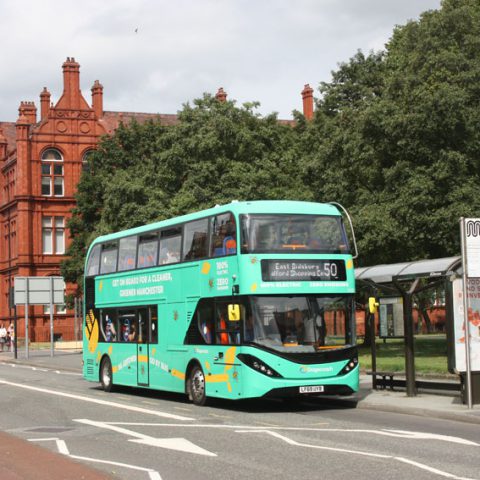1,000 zero emission buses to be deployed in UK thanks to £200 million grants (and consultation launched to set ending date for non-ZE bus sales)
1,000 zero emission buses are to be rolled out in the UK with the backing of nearly £200 million in government funding (around 240 million euros). Twelve areas in England, from Greater Manchester to Portsmouth, will receive grants from the multimillion-pound package to deliver electric or hydrogen powered buses, as well as charging or fuelling […]

1,000 zero emission buses are to be rolled out in the UK with the backing of nearly £200 million in government funding (around 240 million euros). Twelve areas in England, from Greater Manchester to Portsmouth, will receive grants from the multimillion-pound package to deliver electric or hydrogen powered buses, as well as charging or fuelling infrastructure, to their region.
The funding comes from the Zero Emission Buses Regional Area (ZEBRA) scheme, which was launched last year to allow local transport authorities to bid for funding to purchase zero emission buses.
The government has launched a public consultation seeking views on setting a specific date between 2025 and 2032 for ending the sale of new non-zero emission (at the tailpipe) buses.
National Bus Strategy goes ahead in the UK
On 26 March 2022 it was announced that £198.3 million of funding will provide 943 buses. The financing builds builds on almost £71 million announced last year to support up to 335 new zero emission buses in 5 areas; on a further £50 million funding for the UK’s first All Electric Bus City, Coventry, supporting up to 300 buses; finally on 100 buses funded by previous funding schemes.
The move is expected to remove over 57,000 tonnes of carbon dioxide per year from the country’s air, as well as 22 tonnes of nitrogen oxides on average each year, as government continues to go further and faster to achieve net zero, clean up the transport network and build back greener.
It is also part of the government’s wider £3 billion National Bus Strategy to significantly improve bus services, with new priority lanes, lower and simpler fares, more integrated ticketing and higher frequencies.
Road is paved to deploy 4,000 ZE buses by 2025
The first orders have already been placed. Hundreds more zero emission buses have been funded in London, Scotland, Wales and Northern Ireland.
The government stresses that it remains on track to deliver its commitment to fund a total of 4,000 zero-emission buses across the country – which the Prime Minister promised in 2020 to “drive forward the UK’s progress on its net zero ambitions” and to “build and rebuild those vital connections to every part of the UK”.
London, Scotland, Wales in the National Bus Strategy
Government funding of Transport for London has supported the introduction of 300 zero emission in London. Around 600 zero emission buses have been funded in Scotland, Wales and Northern Ireland as a result of the block grant to the devolved administrations.
The areas whose business cases were approved and will be receiving funding are:
- Norfolk
- North Yorkshire
- Portsmouth
- Blackpool
- Nottingham
- Greater Manchester
- Hertfordshire
- South Yorkshire
- Oxfordshire
- West Midlands
- York
- West Yorkshire
National Bus Strategy to lower costs of public transport
Transport Secretary Grant Shapps said: «I will level up and clean up our transport network. That’s why I’ve announced hundreds of millions of pounds to roll out zero emission buses nationwide. Not only will this improve the experience of passengers, but it will help support our mission to fund 4,000 of these cleaner buses, reach net zero emissions by 2050 and build back greener. Today’s announcement is part of our National Bus Strategy, which will introduce lower fares, helping drive down the cost of public transport even further for passengers».
Transport Minister Baroness Vere said: «We recognise the scale of the challenge the world faces in reaching net zero. That’s why reducing emissions and creating green jobs lies at the heart of our transport agenda. Today’s multimillion-pound investment is an enormous step towards a cleaner future, helping ensure transport is fit for generations to come and allowing millions of people to get around in a way that is kinder to our environment».
Martin Griffiths, Stagecoach Chief Executive, said: «We welcome this announcement, which will complement the significant investment and initiatives by operators as we work together to transition to a zero emission bus fleet and help the country achieve its net zero ambitions. Stagecoach has already started its journey towards our target of a fully zero emission UK bus fleet by 2035, and there is also a major opportunity to deliver cleaner air by people switching to more sustainable public transport, cycling and walking. Britain’s buses have an exciting future ahead, helping decarbonise the country, as well as driving economic recovery and levelling up our communities».







